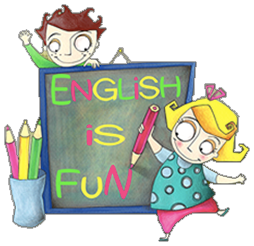
TENSES:
basically express the time at which something happens. The verb changes to show when something takes place (This is a generalization as tenses can also be used to express more complex things).
Present Simple:
This can be used to talk about timetables, e.g. ‘The plane leaves at 10.30’.
It can also express habit, e.g. ‘He eats breakfast at 6am every day’.
General truths e.g. ‘She works for the government’.
Permanent states e.g. ‘She works for the government’.
Reactions/immediate thoughts e.g. ‘That dress looks nice’.
Commentaries e.g. ‘Jackson runs with the ball, he turns …’
Historical e.g. ‘Shakespeare writes good stories’.
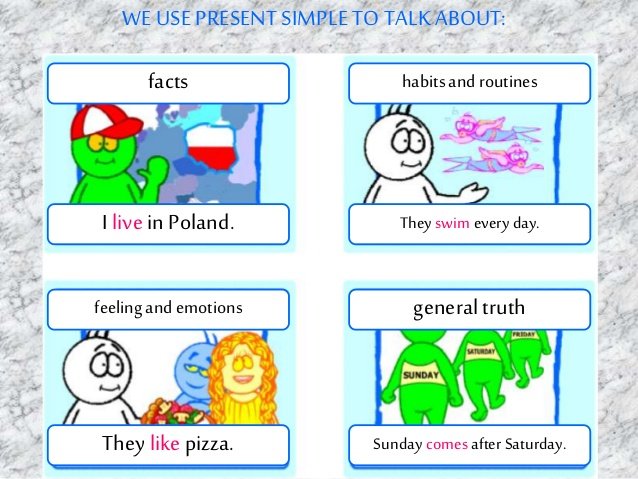
Present Continuous:
This can be to talk about Future plans e.g. ‘ I am having a party on Friday’
An action in progress at the moment of speaking e.g. ‘ He is reading a book’.
Temporary actions or states e.g. ‘ She is living in New York until Spring’.
Habit (usually annoying) e.g. ‘They are always complaining about the weather’.
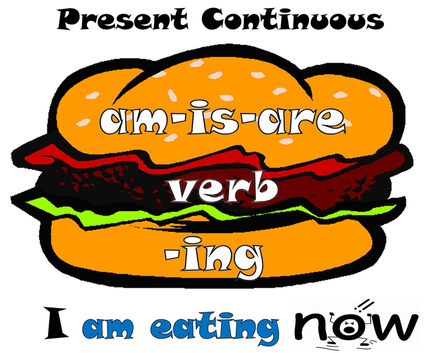
Future Simple
I will play (do something) today.
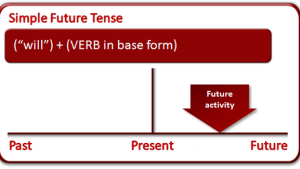
Future Continuous:
An action which is in progress in the future e.g.
‘They will be flying over Spain this time next week’.
Future Perfect:
An action which will be completed by a time further in the future e.g.
‘I will have driven 600 kilometers by 9 pm’.
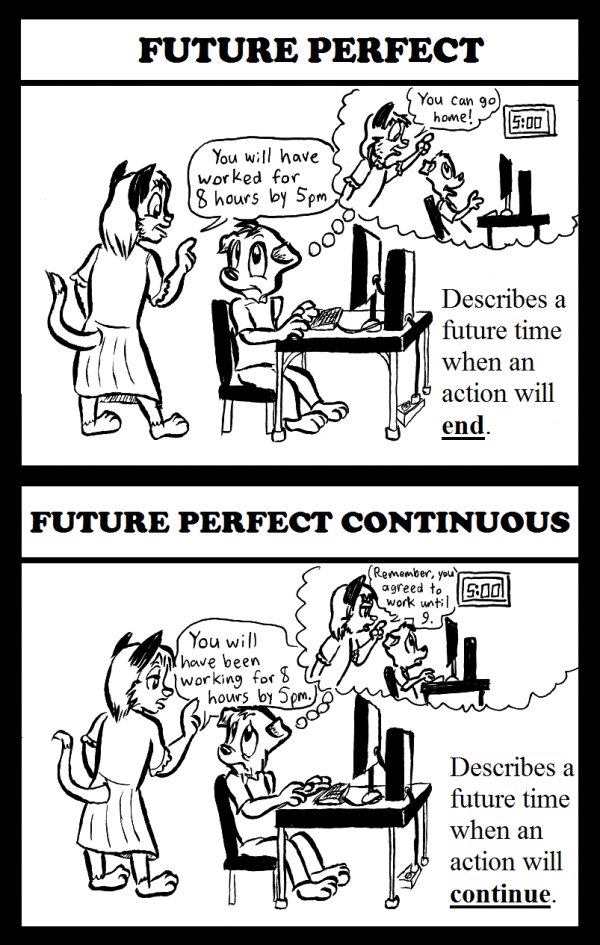
Future Perfect Continuous:
Duration of an action as viewed from the future e.g.
‘She will have been making jewelry for her shop for ten years by next month’.
Present Continuous for Future:
To express future intentions e.g.
‘ We are having a party on Friday’
Present Simple for Future:
To express certainty about scheduled events e.g.
‘They arrive at nine this evening’.
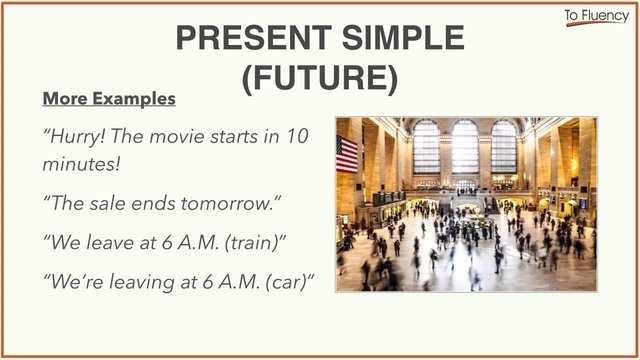
‘Be going to’ for Future:
To express certainty about the future e.g.
‘He is going to be late if he doesn’t hurry up’.
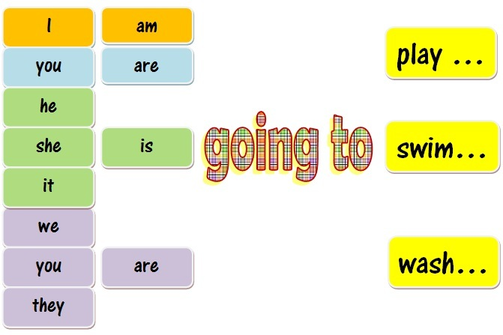
Conditionals:
These are used when you need to talk about possible situations and their consequences.
First Conditional:
To express certainty about the consequences of an action that is expected to happen e.g.
‘If you go to Dubai, you will see the Burj Khalifa’.
If + present, modal verb + present.
Second Conditional:
To express a purely hypothetical consequence of a hypothetical situation e.g.
‘If you went to Dubai, you would see the Burj Khalifa’.
Third Conditional:
To express consequences of past actions that cannot be changed e.g.
‘ If you hadn’t eaten so much chocolates, you wouldn’t have felt so sick’.
If + past perfect, modal verb + present perfect’.
Zero conditional:
To express consequences of fact e.g.
‘ If you heat water, it boils’.
Subjects and Objects:
Subjects in sentences are the person/s or the thing which does the action (verb) e.g.
‘Anna teaches Mathematics’.
Direct Objects in sentences are person/s or things that the action affects directly e.g.
'Anna teaches Mathematics'.
Indirect Objects in sentences are person/s or things which are affected by both the subject and direct object e.g.
‘Anna teaches Mathematics to me’.
Follow this link to see my previous post about: English grammar made easy
Resources:
https://www.ego4u.com/en/cram-up/grammar/tenses
https://learnenglish.britishcouncil.org/en/english-grammar/verbs/present-tense
http://www.englisch-hilfen.de/en/grammar_list/zeitformen.htm

Is I my tens okay ?
Downvoting a post can decrease pending rewards and make it less visible. Common reasons:
Submit
Downvoting a post can decrease pending rewards and make it less visible. Common reasons:
Submit
Thank you for the great post, It will help guys like me a lot!
Downvoting a post can decrease pending rewards and make it less visible. Common reasons:
Submit
Downvoting a post can decrease pending rewards and make it less visible. Common reasons:
Submit
Hmmm you are like a naughty child!
Downvoting a post can decrease pending rewards and make it less visible. Common reasons:
Submit
He is! lol!
Downvoting a post can decrease pending rewards and make it less visible. Common reasons:
Submit
Excellent worksheet. I can surely use this for a lot of my kids and it is a good summary all in one
Downvoting a post can decrease pending rewards and make it less visible. Common reasons:
Submit
That's great news! You are more than welcome!
Downvoting a post can decrease pending rewards and make it less visible. Common reasons:
Submit
Congratulations! This post has been upvoted from the communal account, @minnowsupport, by Belinda from the Minnow Support Project. It's a witness project run by aggroed, ausbitbank, teamsteem, theprophet0, and someguy123. The goal is to help Steemit grow by supporting Minnows and creating a social network. Please find us in the Peace, Abundance, and Liberty Network (PALnet) Discord Channel. It's a completely public and open space to all members of the Steemit community who voluntarily choose to be there.
If you like what we're doing please upvote this comment so we can continue to build the community account that's supporting all members.
Downvoting a post can decrease pending rewards and make it less visible. Common reasons:
Submit
This is a great post. I really appreciate the effort and consistency. I actually follow the link from the africa post on steemit.chat. Pls keep it up.
Downvoting a post can decrease pending rewards and make it less visible. Common reasons:
Submit
Thanks @turpsy. I appreciate it!
Downvoting a post can decrease pending rewards and make it less visible. Common reasons:
Submit
Excellent post! WE educators should stick together! I also teach English, post lesson ideas, tips etc. so let's follow and support each other! @bdmomuae
Downvoting a post can decrease pending rewards and make it less visible. Common reasons:
Submit
Thank you @cwbrooch. I will definitely support you ;)
Downvoting a post can decrease pending rewards and make it less visible. Common reasons:
Submit
This post has received a 100% upvote and resteem from @melowd. Thank You to @bdmomuae. For more information about the service, click here!
Downvoting a post can decrease pending rewards and make it less visible. Common reasons:
Submit
Thank you @melowd
Downvoting a post can decrease pending rewards and make it less visible. Common reasons:
Submit
very informative dear
ok i vote you my dear i always remember you friend :)
Downvoting a post can decrease pending rewards and make it less visible. Common reasons:
Submit
Good one! You have a lot of interesting content there :)
Downvoting a post can decrease pending rewards and make it less visible. Common reasons:
Submit
Grammer use to make me tense... but now it don't
Downvoting a post can decrease pending rewards and make it less visible. Common reasons:
Submit
Haha this is a lesson that I really like when I was in high school. Thanks for i can remember again.
Follow n upvote me @madcool
Downvoting a post can decrease pending rewards and make it less visible. Common reasons:
Submit
Downvoting a post can decrease pending rewards and make it less visible. Common reasons:
Submit